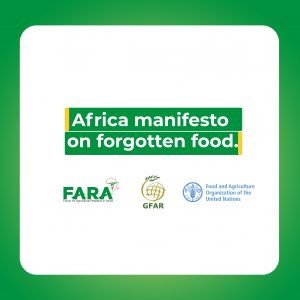الملاحظات التقييمية الرسمية على الحوارات إلى قمة الأمم المتحدة للنظم الغذائية لعام 2021
نوع الحوار
بدعوة من
لغة فعالية الحوار
التاريخ/الوقت
إلى:
المدينة
نطاق التركيز الجغرافي
التنسيق
يُرجى مراجعة التفاصيل أدناه للحصول على معلومات التسجيل إذا كانت متوفرة أو الاتصال بمنظم الحوار إذا كنت ترغب في الحضور.
القيّم
الوصف
Development of Africa Manifesto and Plan of Action on Forgotten foods
Background
The Human Development Index is premised on the balanced attention to issues that drive individual as well as societal wellbeing. The issues of food and nutritional security are central in this goal and they require more inclusive perspectives than the conventional. The upcoming 2021 UN Food Systems Summit (UNFSS) calls for consideration of other issues beyond classical ambits of food security – the availability, affordability and accessibility of food. The food systems thinking takes a deeper perspective at the complete chain of issues and factors from production, through processing, marketing, distribution, quality control and safety, consumption patterns, food waste management, to recycling of nutrients and other elements of environmental sustainability.
The science committee of the UNFSS has highlighted five central action tracks in a normative food system, namely: (1) ensuring access to safe and nutritious food, (2) shifting to a sustainable consumption pattern, (3) boosting nature’s positive production at sufficient scale, (4) advancing equitable livelihoods and value distribution and (5) building resilience to vulnerability, stress, and shocks. One crucial response the revisit of the so-called neglected and underutilized species within the context of the food system. The term forgotten food refers to crop and livestock commodities that have been neglected or underutilized as they have been displaced by increasingly uniform diets fueled by mass-produced processed ingredients from the ‘BIG FOUR’ of wheat, maize, rice and soybean. These four accounts for about two-thirds of the world’s food supply.
The different names for forgotten foods point to the fact that they have been largely displaced from the home menus and pantries due to lifestyle and social changes influenced by colonization, urbanization and globalization and other social elements. FAO[1] notes that forgotten foods are “often overlooked by policymakers, researchers and extension agents” and that “governments rarely allocate resources for their promotion and development.” These crops are often seen as food for the poor with very low utilization and economic importance. Hence, new varieties were hardly developed save for the landraces, and knowledge on their genetic make-up, the agronomic requirement for production and utilization has not been sufficiently developed to merit commercial interests. However, these commodities are well adapted to the agroecologies where they are found and they play vital roles in social and cultural lives of rural communities. The Africa orphan crop consortium has listed 101 orphan crops on the continent (http://africanorphancrops.org/meet-the-crops ). Available data also indicates these crops are highly nutritious. Furthermore, their adaptation characteristics especially, drought tolerance, capacity to thrive on marginal soils and climatic condition makes these commodities a vital asset for food security considering the impending vagaries of climate change.
The exploration of forgotten commodities has gained prominence following the work of ICRISAT on Sorghum and Millet under the “Smart Food” program which explores varietal development, agronomic practices as well as processing to generate new products. FARA is aligning with this work to develop the “Smart Food Africa” initiative which sets out to expand the work done by ICRISAT on Sorghum and Millet to other neglected commodities and develop a “smart food” research and development program for their economic utilization. For the potential of forgotten foods to be realized, collective actions are required at the global, regional, national levels. These actions involve creating awareness and communicating the economic, nutritional, environmental and cultural values of these foods. They also involve the provision of the needed enabling environment for the development of these foods through research; empowering farmers in production; and supporting the private sector in processing, value addition marketing etc.
The recent call by the Global Forum on Agricultural Research and Innovation (GFAR) for increased attention on forgotten foods offers an opportunity for Africa to re-examine the value of these foods in enriching the continent’s food system. The increased attention on forgotten foods will need to take a holistic view and design actions that will not only create awareness but lead to the development of new technologies for production and utilization as well as the development of appropriate policies and businesses.
The GFAR-led global effort on forgotten foods is initially aimed at developing a manifesto on these foods and drawing on it to develop a plan of action to advance these foods. To this end, GFAR is pursuing a bottom-up approach wherein the global manifesto on forgotten foods will be assembled from continental manifestos that will in turn be outcomes of regional consultative processes.
GFAR is joining hands with FARA to co-convene a continental consultation process that will lead to the preparation of Africa’s manifesto on forgotten foods. FARA will thereafter facilitate the creation and operationalization of the Africa Community of Practice on forgotten foods which will represent the continent in the crafting of the global manifesto on forgotten foods and in the preparation of a plan of action.
This concept note outlines the initial activity of co-convening a continental stakeholder dialogue aimed at informing the development of an African manifesto on forgotten foods and building African ownership of it.
Objectives
The central objective of the stakeholder’s dialogue on forgotten foods is to develop a comprehensive stakeholder-owned Africa manifesto on forgotten foods.
Specific objectives are:
- Facilitating effective engagement of stakeholders in Africa’s food systems to actively contribute to crafting the manifesto on forgotten food.
- Validation of a working paper on the state of the forgotten foods in Africa.
- To increase awareness about forgotten foods and build momentum towards the subsequent implementation of the plan of action.
[1] FAO, 2017, Promoting neglected and underutilized crop species, –http://www.fao.org/news/story/en/item/1032516/icode/
الشكر والتقدير


